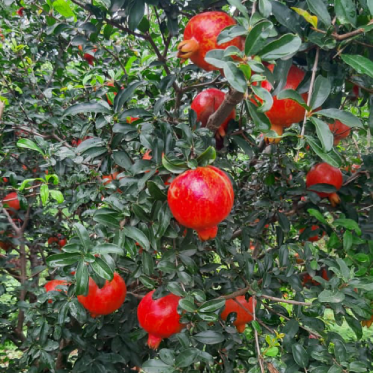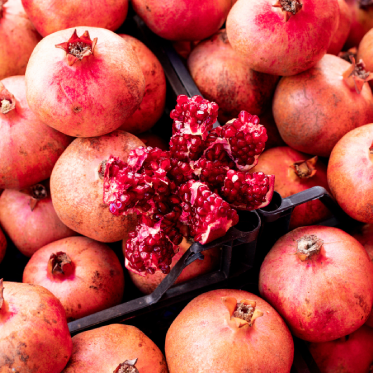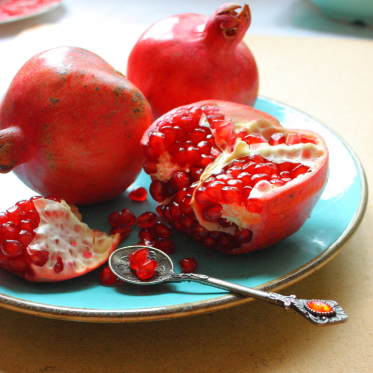Certainly! Sustainable farming of pomegranates in the Solapur region of Maharashtra, India, is a growing practice that not only benefits the environment but also enhances the economic viability of the farms. Here’s a detailed case study on how one farm in Solapur has successfully implemented sustainable farming practices to grow pomegranates.
Case Study: Sustainable Pomegranate Farming in Solapur, Maharashtra
Background
- Location: Solapur, Maharashtra, India
- Size: 100 acres
- Ownership: The farm is owned and managed by the Deshmukh family, who have been farming in Solapur for over 50 years.
- Initial Challenges: The farm faced issues such as water scarcity, soil degradation, and high input costs, which were common in the region.
Sustainable Practices Implemented
- Water Management
- Drip Irrigation:The farm installed a drip irrigation system to deliver water directly to the roots of the pomegranate trees, reducing water usage by up to 50%.
- Rainwater Harvesting:Rainwater harvesting structures were built to collect and store rainwater, which is used for irrigation during dry periods.
- Water Recycling:Wastewater from the farm’s operations is treated and reused for irrigation, further conserving water resources.
- Soil Health and Fertility
- Organic Fertilizers:The farm shifted from chemical fertilizers to organic fertilizers, such as compost and vermicompost, to improve soil health and fertility.
- Crop Rotation:A crop rotation system was implemented to prevent soil depletion and reduce the incidence of pests and diseases.
- Cover Crops:Cover crops like legumes were planted to fix nitrogen in the soil and improve its structure.
- Pest and Disease Management
- Integrated Pest Management (IPM):The farm adopted IPM techniques, which involve using a combination of biological, mechanical, and chemical methods to control pests and diseases.
- Biological Control:Beneficial insects and natural predators were introduced to control pest populations.
- Mechanical Control:Physical barriers and traps were used to prevent pests from reaching the pomegranate trees.
- Minimal Chemical Use:Chemical pesticides were used only as a last resort and in minimal quantities to reduce environmental impact.
- Energy Efficiency
- Solar Power:Solar panels were installed to power the farm’s irrigation systems and other electrical needs, reducing reliance on fossil fuels.
- Energy-Efficient Equipment:Energy-efficient pumps and motors were used to further reduce energy consumption.
- Waste Management
- Composting:Organic waste from the farm, such as pruned branches and fallen leaves, was composted and used as fertilizer.
- Recycling:Plastic and other non-organic waste were recycled or disposed of responsibly.
- Biodiversity and Ecosystem Health
- Hedgerows and Windbreaks:Hedgerows and windbreaks were planted to provide habitat for beneficial insects and birds, which help in pollination and pest control.
- Pollinator-Friendly Plants:Plants that attract pollinators were planted around the farm to enhance pollination and increase yield.
- Community and Social Responsibility
- Local Sourcing:The farm sourced inputs like seeds and organic materials from local suppliers, supporting the local economy.
- Fair Labor Practices:Workers were provided with fair wages, safe working conditions, and regular training to improve their skills.
- Community Engagement:The farm engaged with the local community through educational programs and workshops on sustainable farming practices.
- Technology and Innovation
- Soil Sensors:Soil moisture sensors were installed to monitor soil conditions and optimize irrigation.
- Weather Stations:Weather stations were set up to provide real-time data on temperature, humidity, and rainfall, helping in better planning and decision-making.
- Data Analytics:Data analytics tools were used to track and analyze various metrics, such as soil health, plant growth, and water usage.
Results
- Increased Yield: The farm saw a significant increase in pomegranate yield, from 1,000 kg per acre to 1,500 kg per acre.
- Reduced Costs: Water and fertilizer costs were reduced by 40%, and energy costs were reduced by 30% due to the use of solar power and efficient equipment.
- Improved Soil Health: The soil quality improved, leading to healthier plants and better fruit quality.
- Environmental Impact: The farm’s carbon footprint was reduced, and the local ecosystem was enhanced through the introduction of hedgerows and pollinator-friendly plants.
- Community Support: The farm’s commitment to fair labor practices and community engagement earned it a positive reputation and strong local support.
Key Takeaways
- Water Conservation:Drip irrigation and rainwater harvesting are essential for conserving water in water-scarce regions like Solapur.
- Soil Health:Organic fertilizers and crop rotation are crucial for maintaining soil health and fertility.
- Pest Management:Integrated pest management techniques can effectively control pests and diseases while minimizing the use of chemicals.
- Energy Efficiency:Solar power and energy-efficient equipment can significantly reduce energy costs and environmental impact.
- Waste Reduction:Composting and recycling can help in managing waste and reducing the farm’s environmental footprint.
- Biodiversity:Planting hedgerows and pollinator-friendly plants can enhance biodiversity and ecosystem health.
- Community Engagement:Supporting the local community through fair labor practices and educational programs can build a positive reputation and strong local relationships.
Example Scenario
Farm: Deshmukh Pomegranate Farm, Solapur, Maharashtra
Sustainable Practices:
- Water Management: Drip irrigation and rainwater harvesting structures.
- Soil Health: Use of organic fertilizers and crop rotation.
- Pest Control: IPM techniques, including biological and mechanical methods.
- Energy Efficiency: Solar panels and energy-efficient equipment.
- Waste Management: Composting and recycling of organic and non-organic waste.
- Biodiversity: Planting hedgerows and pollinator-friendly plants.
- Community Engagement: Local sourcing, fair labor practices, and educational programs.
Outcome:
- Higher Yield: The farm achieved a higher yield of pomegranates, which was more consistent year-to-year.
- Lower Costs: Reduced input costs and energy costs improved the farm’s profitability.
- Better Quality: The pomegranates were of higher quality, with better taste and longer shelf life.
- Environmental Benefits: The farm’s practices reduced water usage, chemical inputs, and carbon emissions.
- Community Support: The farm’s commitment to the local community earned it a positive reputation and strong local support.
By implementing these sustainable practices, the Deshmukh family not only improved the productivity and profitability of their farm but also contributed to the environmental and social well-being of the Solapur region.









